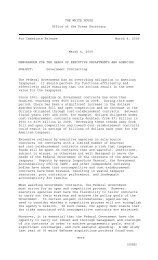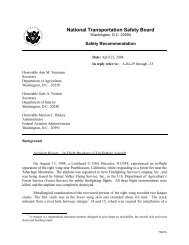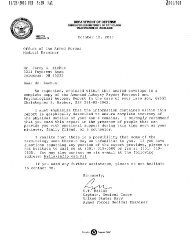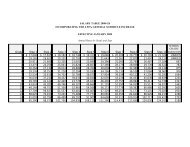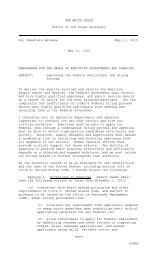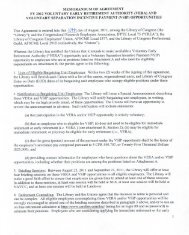Report - Government Executive
Report - Government Executive
Report - Government Executive
Create successful ePaper yourself
Turn your PDF publications into a flip-book with our unique Google optimized e-Paper software.
• Disincentives to become a supervisor because DCIPS imposes additional work<br />
requirements with no increase in compensation;<br />
• The extent and nature of employees’ negative reaction to DCIPS. One manager said,<br />
“We are intelligence officers and we were surprised at how the workforce reacted. We<br />
aren’t supposed to be surprised”; and<br />
• Concern that administrative positions in pay bands 1 and 2—which have a higher<br />
percentage of women and minorities than pay bands 3, 4, and 5—tend to receive lower<br />
average performance ratings than those in higher bands because the work is not so clearly<br />
linked to the mission.<br />
Online Dialogue Participants<br />
Participants in the Academy’s online dialogue identified several areas of concern:<br />
• A belief that DCIPS reduces promotion opportunities and career progression. Both<br />
DCIPS’ complexities and the elimination of the GS grades and steps have resulted in the<br />
impression that career and salary progression are now harder to achieve. By design,<br />
DCIPS provides for fewer promotions and it is entirely possible for employees to spend<br />
most or all of their careers in a single pay band. Although salary progression may equal<br />
or exceed what the GS system provides for most employees, the reduced number of<br />
“milestone events,” such as promotions to the next grade, seems to promote a negative<br />
view;<br />
• Concern that DCIPS inhibits collaboration among employees. Although the performance<br />
elements on which all employees will be rated include an element on cooperation and<br />
collaboration, the emphasis on individual achievement and reward is seen as working<br />
against collaborative efforts: “DCIPS forces employees into contests for claiming credit.<br />
This is not good for teambuilding or productivity”;<br />
• A perception that morale is suffering. Said one, “The appraisal system associated with<br />
DCIPS is not a good motivator, and can be demoralizing.” This perception has been<br />
compounded by the confusion resulting from the interim policies and procedures<br />
necessitated by the NDAA pause; and<br />
• The amount of time spent on performance management is seen as excessive. Both<br />
managers and subordinate staff made this observation. One remarked, “As a first line<br />
supervisor, I had to conduct write-ups on 22 civilians—both performance objectives (4<br />
on each employee) and elements (6 on each employee). Doing a total of 220 write-ups in<br />
two weeks was a nightmare!! Plus, I had to do my own assessment. I simply don’t<br />
understand what this is supposed to accomplish.”<br />
Open Forum Participants<br />
The perspectives of intelligence component employees vary broadly. However, several<br />
consistent themes emerged during the Academy open forums.<br />
95





